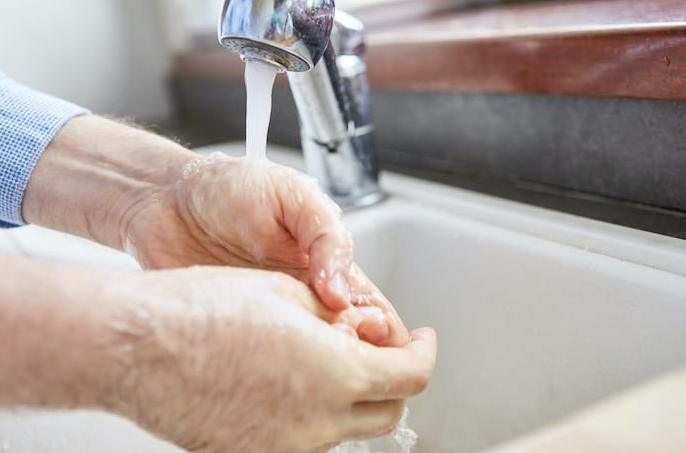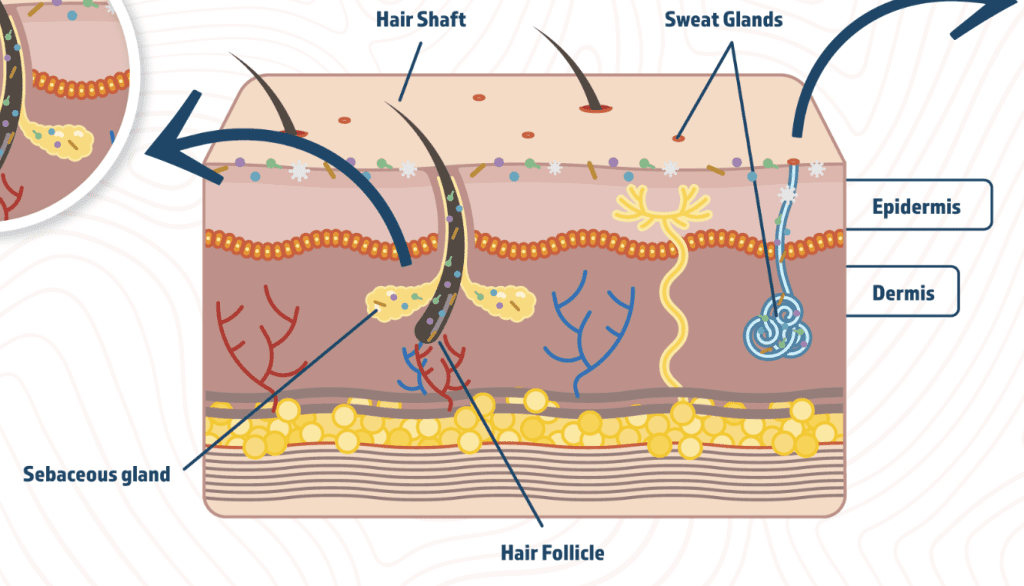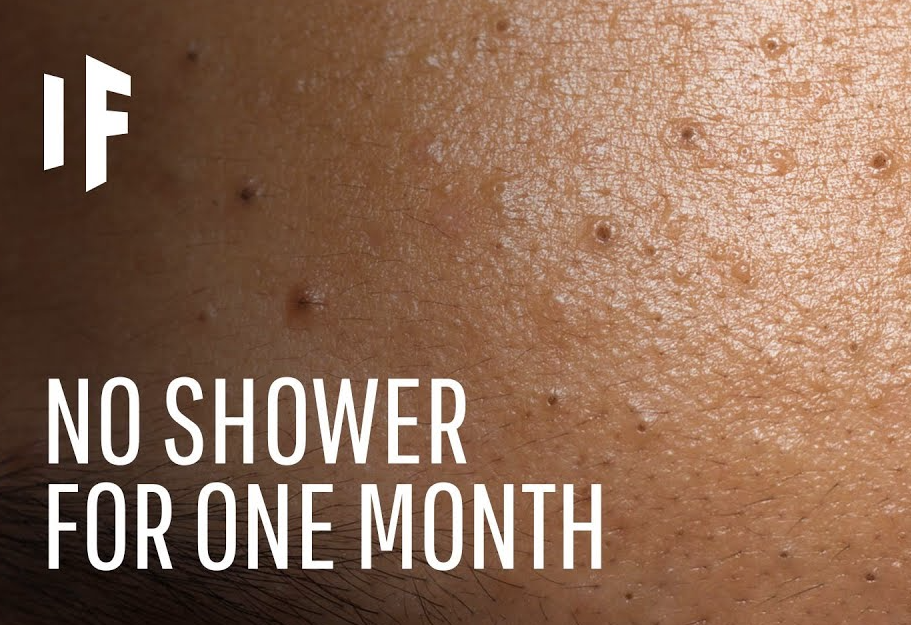While many of us have probably skipped a day or two, the consequences of consistently neglecting personal hygiene can be more serious than just an unpleasant odor. In this blog post, we will delve into the importance of maintaining good hygiene practices and how failing to do so can lead to various skin conditions and health issues.
We’ll discuss recommendations for shower frequency based on lifestyle factors, as well as explore the role sweat and bacteria play in body odor. Furthermore, we’ll examine dermatitis neglecta – a direct result of poor hygiene – along with its symptoms and prevention methods.
Additionally, this post will address oily hair build-up and scalp irritation issues that may arise from not washing regularly. We will also touch upon finding balance between underwashing and overwashing your body by looking at Dr. James Hamblin’s “one-month no-shower” experiment.
Lastly, we will investigate what happens when you don’t shower in terms of persistent body odor after long periods without bathing, dry skin care techniques for targeted washing approaches, and fungal growth in moist areas of the body due to improper hygiene practices.
The Importance of Personal Hygiene
Maintaining personal hygiene is crucial for overall health. Experts suggest showering periodically, with certain lifestyles necessitating more regular showers. Establishing a routine is essential, as sweat can mix with bacteria on your skin and cause body odor (B.O.). Some people also notice that skipping showers worsens breakouts, so daily showering might be necessary for them.

Shower frequency recommendations based on lifestyle factors
Your showering frequency depends on various factors such as physical activity levels, climate, occupation, and personal preferences. For instance:
- If you’re a gym rat or live in a hot and humid place where you sweat like a pig, daily showers are a must to wash away accumulated dirt and bacteria.
- People working in healthcare or other jobs involving close contact with others should consider showering more frequently to reduce the risk of spreading germs.
- For those with sensitive skin or suffering from eczema, a dermatologist’s advice should be sought on how to adjust shower routines.
How sweat and bacteria contribute to body odor
Sweat itself doesn’t stink, but body odor occurs when sweat mixes with bacteria on your skin’s surface. The warm and moist environment created by sweating provides an ideal breeding ground for these microorganisms. As they break down proteins found in our perspiration into acids, it produces an unpleasant smell commonly known as B.O.. Regularly washing your body helps remove sweat and bacteria, thus preventing the development of body odor.
It’s essential to find a balance between underwashing and overwashing your body. Over-cleansing can strip away natural oils that keep our skin moisturized, leading to dryness and irritation. Conversely, insufficient bathing can lead to a buildup of dirt, oil and bacteria on the skin – increasing the likelihood of infection or unpleasant aromas. Experiment with different shower frequencies until you find what works best for you while keeping in mind factors such as climate, activity levels, occupation, and personal preferences.
Bacteria and Fungus Living on Our Skin
Did you know that your skin is a bustling metropolis of microorganisms? It’s true. There are up to 1,000 species of bacteria and 80 types of fungus living on your body. But don’t worry, most of these little guys are actually good for you and help protect you from harmful germs.
The Role of Beneficial Bacteria in Protecting Our Bodies
Benevolent bacteria on the epidermis cooperate with your body’s immunity to prevent hostile microorganisms from taking hold. They do this by competing for resources and producing substances that inhibit the growth of dangerous invaders. This delicate balance is known as the “skin microbiome.”
To keep your skin healthy, it’s important to maintain a healthy balance of good and bad bacteria. Regular showers help remove dirt, sweat, dead cells, and excess oils that can disrupt this balance.

The Consequences of Not Washing Regularly
If you don’t shower often enough or don’t wash thoroughly, germs can start to flourish on your skin. Unhygienic practices can result in infections and inflammation caused by the proliferation of pathogenic microorganisms.
- Tinea Versicolor: A common fungal infection that causes small discolored patches mainly on the chest and back areas (source).
- Athlete’s Foot: A fungal infection that typically begins between the toes and can cause itching, burning, or cracked skin (source).
- Folliculitis: Inflammation of hair follicles caused by bacterial or fungal infections, leading to red bumps and sometimes pus-filled sores (source).
To prevent these issues, establish a regular shower routine. Listen to your body and adjust your showering routine as needed.
Dermatitis Neglecta – A Result Of Poor Hygiene
When you don’t shower regularly or exfoliate dead skin cells properly, dermatitis neglecta may occur. This condition is characterized by brown patches on the skin caused by accumulated dirt and oil. If left untreated, it could exacerbate existing flare-ups in certain individuals.
Symptoms of Dermatitis Neglecta
- Brown or grayish-brown patches on the skin
- Rough texture due to accumulation of dirt and oils
- Possible itching or irritation around affected areas
- Worsening of pre-existing skin conditions such as eczema or psoriasis for some people
The symptoms can be easily mistaken for other common skin issues; however, a closer examination will reveal that these patches are actually caused by poor hygiene practices.
Prevention through Proper Hygiene Practices
To prevent dermatitis neglecta from developing, it’s essential to maintain good personal hygiene habits. Here are some tips:
- Shower regularly: Aim to shower every two to three days at minimum, depending on your lifestyle factors and personal preferences.
- Exfoliate your body: Use a gentle scrubbing tool like a loofah or an exfoliating glove during showers to remove dead skin cells effectively. Remember not to over-exfoliate as this can cause irritation too. You can find more information about proper exfoliation techniques from reputable sources like the American Academy of Dermatology Association (AAD).
- Use mild soap: Opt for a gentle, fragrance-free soap to cleanse your skin without causing irritation. The National Center for Biotechnology Information (NCBI) suggests that using harsh soaps can strip away the natural oils on your skin and disrupt its protective barrier.
- Maintain a healthy diet: Consuming nutrient-rich foods can help promote overall skin health and prevent various dermatological issues. According to the Journal of American Medical Association Dermatology, certain nutrients like vitamins A, C, D, E, and omega-3 fatty acids are essential for maintaining healthy skin.
Incorporating these practices into your daily routine will not only help prevent dermatitis neglecta but also contribute to better overall hygiene and well-being.
Poor hygiene practices can lead to dermatitis neglecta, characterized by brown patches on the skin caused by accumulated dirt and oil. To prevent this condition, it’s essential to maintain good personal hygiene habits such as showering regularly, exfoliating dead skin cells properly with a gentle scrubbing tool like a loofah or an exfoliating glove during showers, using mild soap and consuming nutrient-rich foods that promote overall skin health.
Oily Hair and Scalp Irritation Issues
Don’t let oily hair and scalp irritation ruin your day. According to Dr. Elizabeth Bahar Houshmand M.D. and Dr. Aishah Muhammad, maintaining a regular shampoo schedule is crucial for overall health.
The Causes of Oily Hair Build-up
- Overactive sebaceous glands: These glands produce sebum, which keeps our skin and hair moisturized. However, too much sebum can cause oily hair.
- Hormonal changes: Puberty or pregnancy can trigger increased oil production in the scalp.
- Lack of proper washing routine: Skipping showers or using the wrong shampoo for your hair type can contribute to excessive oiliness.
Tips for Managing Scalp Irritation
- Select the right shampoo: Choose a gentle shampoo specifically formulated for oily scalps that will help regulate excess sebum production without stripping away natural oils completely. Avoid harsh chemicals that might exacerbate irritation. (source)
- Wash frequently but gently: Wash your hair every other day or as needed, depending on the severity of oiliness. Be gentle when massaging the shampoo into your scalp to avoid aggravating any irritation.
- Rinse thoroughly: Make sure you rinse out all traces of shampoo and conditioner from your hair to prevent product buildup that can worsen oily hair and irritate the scalp.
- Avoid overbrushing: Overbrushing can stimulate sebum production, so try not to brush more than necessary. Use a wide-tooth comb instead of a brush for detangling wet hair gently. (source)
- Try natural remedies: Some people find relief by using natural ingredients like apple cider vinegar or tea tree oil in their hair care routine. However, it’s essential to patch test these remedies first before applying them directly onto an irritated scalp. Always dilute with water or carrier oils if needed. (source)
Incorporating these tips into your personal hygiene routine will help manage oily hair and reduce associated scalp irritation issues effectively.
Regular shampooing is crucial to prevent oily hair and scalp irritation caused by overactive sebaceous glands, hormonal changes, or lack of proper washing routine. To manage scalp irritation, choose a gentle shampoo for oily scalps, wash frequently but gently, rinse thoroughly, avoid overbrushing and try natural remedies such as apple cider vinegar or tea tree oil after patch testing them first.
Finding Balance Between Underwashing and Overwashing
Dermatologists suggest finding a balance between too little washing – which leads to germ accumulation – and excessive cleaning – which depletes protective substances from our bodies. James Hamblin MD has suggested trying out one month without showering as an experiment in understanding how much we truly need daily bathing rituals for basic hygiene maintenance purposes alone.
Risks of Overwashing Your Body
- Stripping Natural Oils: Over-cleansing can strip away the skin’s natural oils, leading to dryness and irritation.
- Weakening the Skin Barrier: Frequent washing may weaken the skin’s barrier function, making it more susceptible to infections and irritations.
- Affecting Good Bacteria: Excessive cleansing can disrupt the balance of beneficial bacteria on our skin, potentially allowing harmful germs to thrive.
To avoid these risks, consider using gentle cleansers that are free of harsh chemicals or fragrances. Additionally, limit showers to once per day or every other day if possible.
The “One-Month No-Shower” Experiment by James Hamblin MD
In his article for The Atlantic, Dr. Hamblin documented his experience going an entire month without showering. Instead of using soap and water during this time, he relied on a bacterial spray called “Mother Dirt” to maintain his skin’s health. The results of the experiment were surprising: not only did he report no significant increase in body odor, but his skin also appeared healthier and less prone to irritation.
While Dr. Hamblin’s experiment is an extreme example, it highlights the importance of finding a balance between underwashing and overwashing our bodies. For most people, showering every day or every other day should be sufficient for maintaining good hygiene without causing harm to our skin.
Tips for Striking the Right Balance
- Listen to Your Body: Pay attention to how your skin feels after showering – if it feels tight or dry, you may need to adjust your routine.
- Choose Gentle Products: Opt for mild cleansers and moisturizers that won’t strip away natural oils or disrupt the skin’s barrier function.
- Avoid Hot Water: Hot showers can further exacerbate dryness; instead, use lukewarm water when bathing.
Finding the right balance between underwashing and overwashing is crucial for maintaining good hygiene without harming our skin. Over-cleansing can strip away natural oils, weaken the skin’s barrier function, and disrupt beneficial bacteria on our skin. To strike the right balance, consider using gentle products, avoiding hot water, and paying attention to how your skin feels after showering.
Persistent Body Odor After Long Periods Without Showering
Skipping a shower here and there might not cause significant issues, but after a month without proper hygiene practices, body odor will likely become noticeable. After a month without proper hygiene practices, some individuals may find that their body odor persists for an extended period of time.
Factors affecting the persistence of body odor
- Sweat: Sweat itself is generally odorless, but when it mixes with bacteria on your skin, it can produce an unpleasant smell. The intensity of your body odor may become more pungent if you perspire heavily and don’t bathe or use deodorants.
- Diet: What you eat can also affect how you smell. Foods like garlic and onions contain sulfur compounds that are released through your pores when broken down by your body. These compounds contribute to strong-smelling perspiration.
- Hormones: Hormonal changes in both men and women can lead to increased sweating and stronger odors. Stress hormones such as cortisol have been linked to an increase in sweat production which contributes significantly towards bad smells emanating from our bodies during times of high anxiety levels (source).
Tips for managing unpleasant smells
- Cleanse regularly: Even if you don’t have time for a full shower every day, washing key areas (armpits, groin) with soap at least once daily helps reduce bacterial growth responsible for causing B.O.. You should also change into clean clothes each day to prevent odor-causing bacteria from accumulating on your garments.
- Use antiperspirant: Antiperspirants work by reducing the amount of sweat produced, which in turn helps minimize body odor. Look for products containing aluminum-based compounds that block sweat glands and reduce perspiration (source).
- Watch your diet: As mentioned earlier, certain foods can contribute to strong body odors. Limiting or avoiding these items may help improve your smell over time.
- Maintain good overall hygiene: In addition to showering regularly and using antiperspirant, keeping other aspects of personal care up-to-date (e.g., oral hygiene) is essential in managing unpleasant smells effectively.
Incorporating these tips into your daily routine will not only help manage persistent body odor but also promote better overall health and well-being.
Skipping showers for a long period can lead to persistent body odor, caused by sweat mixing with bacteria on the skin and certain foods like garlic and onions. To manage unpleasant smells, it is important to maintain good overall hygiene, wash key areas regularly with soap, use antiperspirant products containing aluminum-based compounds that block sweat glands and reduce perspiration, watch your diet by limiting or avoiding certain items that contribute to strong body odors.
Dry Skin Care And Targeted Washing Techniques
For those with dry skin, dermatologists recommend using soap only on specific areas of the body and washing these parts post-shower. Going 365 days without showering or bathing would result in an unbearable smell, increased risk of infection, acne breakouts, and bumps all over one’s skin.
Soap usage recommendations for people with dry skin
If you have dry skin, it’s essential to take extra care when choosing your soap products. Opt for gentle soaps that are fragrance-free and contain moisturizing ingredients like glycerin or aloe vera. Avoid harsh cleansers that can strip away your natural oils and further irritate your skin. Focus on those body parts which tend to sweat and smell bad, such as the underarms, groin area, feet, hands and face when lathering up.
Consequences of going an entire year without showering
- Unbearable smell: Without regular showers or baths to wash away accumulated dirt and bacteria from our bodies’ surface layer – we’d eventually develop quite an unpleasant odor.
- Infections: Not maintaining proper hygiene practices increases risks associated with various types of infections, including fungal growths.
- Bumps & Acne Breakouts: A buildup of dead cells mixed together along pores could lead towards breakouts forming across different regions within one’s facial region, especially if they’re already predisposed genetically toward developing acne issues due to their unique biological makeup.
While it may be tempting to skip showers to save time or water, the consequences of not maintaining proper hygiene can lead to a host of problems. For those with dry skin, finding a balance between overwashing and underwashing is crucial. By using gentle soaps on targeted areas and taking care of your skin post-shower, you can maintain cleanliness without causing further irritation.
In addition to regular bathing habits, consider incorporating other dry skin care tips into your routine. This might include applying moisturizers after showering, using humidifiers during winter months when indoor air tends to be drier than usual due to heating systems running constantly throughout homes across America – even making sure that any clothing worn directly against one’s body isn’t made from fabrics known for their potential ability to irritate sensitive epidermal layers, such as wool.
To avoid dry skin, use gentle soaps with moisturizing ingredients on targeted areas prone to sweat and odor. Skipping showers for a year can result in an unbearable smell, increased risk of infection, acne breakouts, and bumps all over the skin due to accumulated dirt and bacteria. Incorporating other dry skin care tips such as applying moisturizers after showering or using humidifiers during winter months is also recommended.
Fungal Growth In Moist Areas Of The Body
Don’t let fungi make a home in your moist body areas. Neglecting proper hygiene can lead to uncomfortable fungal infections, especially in the groin and toe areas. These infections can cause discomfort and take weeks to heal once proper hygiene is resumed.
Common Types of Fungal Infections in Moist Body Areas
- Athlete’s foot: Also known as tinea pedis, this infection typically occurs between the toes and on the soles of feet due to trapped moisture from sweat.
- Jock itch: Tinea cruris affects the groin area and inner thighs; it thrives in warm, damp environments like sweaty workout clothes or tight underwear.
- Ringworm: Despite its name, ringworm (tinea corporis) is a fungal infection that appears as circular rashes with raised edges on various parts of your body.
- Candidiasis: This yeast infection commonly occurs in moist folds of skin such as underarms or beneath breasts; candidiasis can also affect genital areas (e.g., vaginal yeast infections).
Importance of Proper Hygiene for Preventing Fungal Growth
Maintaining good personal hygiene plays a crucial role in preventing these uncomfortable conditions. Here are some tips you should follow:
- Dry yourself thoroughly after showering: To prevent moisture from accumulating in susceptible areas, make sure to dry your skin completely after bathing. Pay special attention to spaces between toes and other folds of the body.
- Change socks and underwear daily: Fresh, clean clothing helps reduce the likelihood of fungal growth. Opt for moisture-wicking fabrics that help keep sweat away from your skin.
- Avoid tight-fitting clothes: Tight garments can trap heat and moisture against your body, creating an ideal environment for fungi to thrive. Choose loose-fitting clothing whenever possible.
- Use antifungal powders or creams: If you’re prone to fungal infections or live in a humid climate, consider using over-the-counter antifungal products as a preventive measure. Before commencing any new regimen, it is advised to consult a healthcare provider.
Practicing good hygiene on a daily basis is essential for maintaining health and preventing illness. Remember that our bodies’ natural defense mechanisms work best when supported by consistent hygiene practices.
Neglecting proper hygiene can lead to uncomfortable fungal infections, especially in moist body areas. Athlete’s foot, jock itch, ringworm and candidiasis are common types of fungal infections that thrive in warm and damp environments. To prevent these conditions, maintain good personal hygiene by drying yourself thoroughly after showering, changing socks and underwear daily, avoiding tight-fitting clothes and using antifungal powders or creams as a preventive measure.
FAQs in Relation to What Happens When You Don’t Shower
How many days is it okay to skip a shower?
It’s generally acceptable to go 2-3 days without showering, but make sure to wash areas prone to bacteria buildup daily with a washcloth or baby wipes.
How often should women shower?
The ideal shower frequency varies based on factors like skin type, lifestyle, and climate, but most women can safely take showers every other day or less frequently.
Is it necessary to take a shower?
Taking regular showers helps maintain good hygiene by removing dirt, sweat, dead skin cells, and bacteria from our bodies, and consistent neglect of proper hygiene practices can lead to various health issues.
What happens if you don’t shower after sweating?
If you don’t shower after sweating, bacteria and fungi can thrive on your skin, leading to body odor and potential infections, so make sure to at least clean sweat-prone areas with a washcloth or baby wipes.
Conclusion
Skipping showers can lead to a buildup of sweat, bacteria, and fungus on our skin, causing unpleasant body odor and even dermatitis neglecta – a skin condition that results from not washing.
However, overwashing can also have negative effects on the skin, such as stripping away natural oils and disrupting the skin’s microbiome.
To find balance, it’s important to understand how often we should shower based on our lifestyle factors and to practice targeted washing techniques, like using a gentle cleanser and avoiding hot water.
By doing so, we can prevent fungal growth in moist areas of the body and manage oily hair build-up or scalp irritation issues, which can be exacerbated by overwashing.


